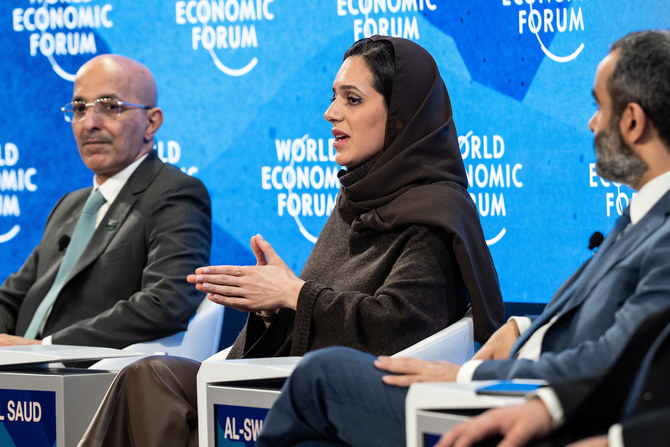
- ARAB NEWS
- 02 Jul 2025

Tarek Ali Ahmad
DAVOS: Over the past decade, Saudi Arabia and other Gulf countries have been steadily diversifying their economies away from oil, offering incentives to attract capital and talent, encouraging small businesses and start-ups, and trying to give their young citizens exciting new career paths in the private sector.
As the largest economy in the Middle East, with ties to both China and the US, Saudi Arabia is well-positioned to use its strategic relationships and hydrocarbon resources to stabilize volatile energy markets and advance economic recovery. Predictably, the Kingdom’s priorities and its response to today’s turbulent geopolitical context are in the limelight as it continues with its reform agenda.
The pace of economic diversification by the Kingdom has quickened greatly since the unveiling of Saudi Vision 2030 in 2016 by (then Deputy) Crown Prince Mohammed bin Salman. The accent is now on business growth, tourism, education, manufacturing, entertainment, health care and other sectors.
This has given rise to speculation among economic analysts as to whether the development can be a win-win for Saudi Arabia and the other Gulf countries, particularly the UAE. The question was put to the speakers in a panel discussion entitled “Saudi outlook” on Wednesday at the World Economic Forum’s annual meeting in Davos.
At today’s Saudi Arabia Outlook session at #WEF22, HE @Khalid_AlFalih shared his insights on the Kingdom’s economic and investment transformation journey under #SaudiVision2030 and their outlook.#SaudiAtDavos pic.twitter.com/SAIU4XAdSq
— وزارة الاستثمار (@MISA) May 25, 2022
Offering to answer the question first, Saudi Minister of Finance Mohammed Al-Jadaan said: “When a country like Saudi Arabia moves, others up their game. We are seeing that in action today. So, it is in the interest of the whole region and not only Saudi Arabia.”
Al-Jadaan’s view was echoed by the other speakers, starting with Khalid Al-Falih, the Saudi minister of investment, who said: “A rising tide lifts all boats. Regional integration is more important to the smaller but very important economies next to us than it is to Saudi Arabia.
“So, I believe the Kingdom’s rise in its economic and competitive performance actually helps their competitiveness. It allows companies and enterprises and the governments of those countries to integrate with the larger global economy in Saudi Arabia.”
Speaking from the perspective of the Saudi Ministry of Tourism, Haifa bint Mohammed Al-Saud, assistant minister for strategy and executive affairs, said: “Competition is critical. We create competition within Saudi Arabia for different destinations because what it does is increase quality. And it’s very healthy because they start complementing each other.”
More broadly, she said: “The region in its entirety is a hub, so once you arrive in the region, it becomes more appealing to visit different destinations. So, (competition is) absolutely to our benefit.”
Faisal Al-Ibrahim, Saudi minister of economy and planning, said: “For me, competition and competitiveness are essential for us to raise the bar higher. But collaboration is also necessary.
“There is a lot of coordination and collaboration that happens behind the scenes. There is a lot of camaraderie between policymakers within the region that gives us these assurances.”
Last year, Saudi Arabia set certain rules for companies seeking to take advantage of the $3 trillion investment opportunities identified for international investors under the Vision 2030 strategy. The government said it would no longer sign contracts with foreign companies without a regional headquarters inside the Kingdom starting from 2024.
The new arrangement is thought to have aroused a sense of competition between Saudi Arabia and the UAE. Talk of economic competition between Saudi Arabia and UAE have continued to make headlines as both announce aggressive initiatives to attract or deploy investment.
However, Hussain Sajwani, chairman of Damac, the Dubai-based Emirati property development company, thinks Saudi Arabia and Dubai are completing each other in terms of growth, rather than competing with each other.
“I think they completing each other in two different economies, two different outlooks,” he told Arab News on the sidelines of the Davos summit on Tuesday.
“Dubai is a connecting point for businesses for travelers, tourism, Saudi Arabia is very different. So Dubai companies help and complete the growth of Saudi Arabia,” he said.
Similar sentiments have been expressed by other Emirati businessmen and government ministers over the past year, with the general consensus being that the two GCC members are independently adjusting their social and economic policies as part of their economic diversification strategies.
In comments to Arab News last November, Badr Al-Olama, an executive director at Abu Dhabi sovereign fund Mubadala, dismissed the idea that Saudi Arabia and UAE’s economic progress is a zero-sum game.
“What many people try to interpret as competition is completely wrong because the market is so large,” he said. “The fact that we are close neighbors means we are able to complement each other with certain capabilities to compete on a global scale.”
In an interview with Arab News in December, Khalifa Shaheen Al-Marar, UAE minister of state, said that the two countries have adopted policies that benefit the entire Arab region and contribute to better outcomes for global peace and human welfare.
“The UAE and Saudi Arabia maintain a close and complementary relationship that benefits the two countries and the wider region, which includes economic and developmental integration,” he said.
“We believe that healthy economic competition in the region is important, and the UAE always views it as an opportunity to generate new prospects and adopt policies that benefit the region as a whole.
“Our two countries’ economic partnership is one based on open exchange and cooperation. The Saudi-Emirati Coordination Council, a high-level bilateral mechanism established to harmonize Saudi Vision 2030 and UAE Vision 2021, continues to play an important role in inking additional economic agreements and streamlining trade between our two countries.”